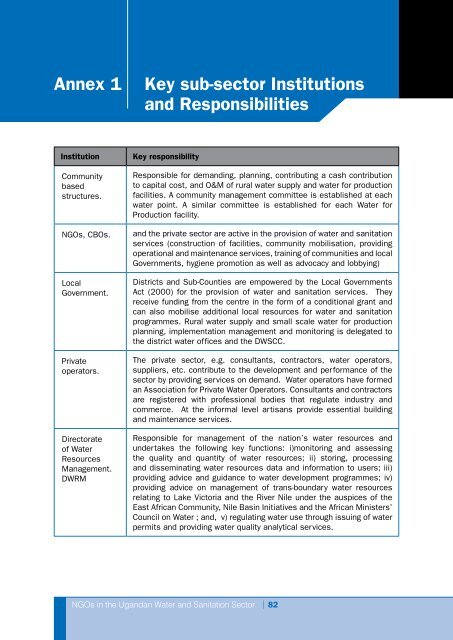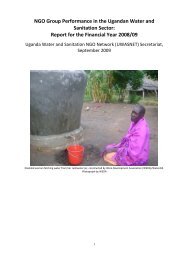Performance Report for FY 2009/10 - UWASNET
Performance Report for FY 2009/10 - UWASNET
Performance Report for FY 2009/10 - UWASNET
Create successful ePaper yourself
Turn your PDF publications into a flip-book with our unique Google optimized e-Paper software.
<strong>Per<strong>for</strong>mance</strong> <strong>Report</strong> <strong>for</strong> <strong>FY</strong> <strong>2009</strong>/<strong>10</strong><br />
Annex 1 Key sub-sector Institutions<br />
and Responsibilities<br />
Institution Key responsibility<br />
Community<br />
based<br />
structures.<br />
NGOs, CBOs.<br />
Local<br />
Government.<br />
Private<br />
operators.<br />
Directorate<br />
of Water<br />
Resources<br />
Management.<br />
DWRM<br />
Responsible <strong>for</strong> demanding, planning, contributing a cash contribution<br />
to capital cost, and O&M of rural water supply and water <strong>for</strong> production<br />
facilities. A community management committee is established at each<br />
water point. A similar committee is established <strong>for</strong> each Water <strong>for</strong><br />
Production facility.<br />
and the private sector are active in the provision of water and sanitation<br />
services (construction of facilities, community mobilisation, providing<br />
operational and maintenance services, training of communities and local<br />
Governments, hygiene promotion as well as advocacy and lobbying)<br />
Districts and Sub-Counties are empowered by the Local Governments<br />
Act (2000) <strong>for</strong> the provision of water and sanitation services. They<br />
receive funding from the centre in the <strong>for</strong>m of a conditional grant and<br />
can also mobilise additional local resources <strong>for</strong> water and sanitation<br />
programmes. Rural water supply and small scale water <strong>for</strong> production<br />
planning, implementation management and monitoring is delegated to<br />
the district water offices and the DWSCC.<br />
The private sector, e.g. consultants, contractors, water operators,<br />
suppliers, etc. contribute to the development and per<strong>for</strong>mance of the<br />
sector by providing services on demand. Water operators have <strong>for</strong>med<br />
an Association <strong>for</strong> Private Water Operators. Consultants and contractors<br />
are registered with professional bodies that regulate industry and<br />
commerce. At the in<strong>for</strong>mal level artisans provide essential building<br />
and maintenance services.<br />
Responsible <strong>for</strong> management of the nation’s water resources and<br />
undertakes the following key functions: i)monitoring and assessing<br />
the quality and quantity of water resources; ii) storing, processing<br />
and disseminating water resources data and in<strong>for</strong>mation to users; iii)<br />
providing advice and guidance to water development programmes; iv)<br />
providing advice on management of trans-boundary water resources<br />
relating to Lake Victoria and the River Nile under the auspices of the<br />
East African Community, Nile Basin Initiatives and the African Ministers’<br />
Council on Water ; and, v) regulating water use through issuing of water<br />
permits and providing water quality analytical services.<br />
NGOs in the Ugandan Water and Sanitation Sector | 82



